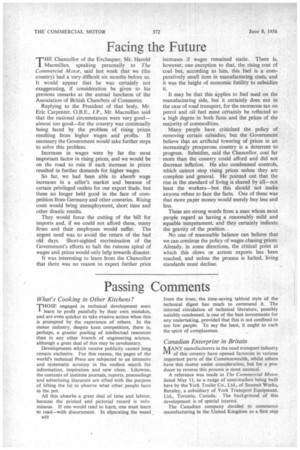Facing the Future
Page 44

If you've noticed an error in this article please click here to report it so we can fix it.
rr HE Chancellor of the Exchequer, Mr. Harold 1 Macmillan, speaking personally to The Commercial Motor, said last week that we (the country) had a very difficult six months before us. It would appear that he was certainly not exaggerating, if consideration be given to his previous remarks at the annual luncheon of the Association of British Chambers of Commerce.
Replying to the President of that body, Mr. Eric Carpenter, 0.B.E., J.P., Mr. Macmillan said that the national circumstances were very good— almost too good—for the country was continually being faced by the problem of rising prices resulting from higher wages and profits. If necessary the Government would take further steps to solve this problem.
Increases in wages were by far the most important factor in rising prices, and we would he on the road to ruin if each increase in prices resulted in further demands for higher wages So far, we had been able to absorb wage increases in a seller's market and because of certain privileged outlets for our export trade, but these no longer held good in the face of competition from Germany and other countries. Rising costs would bring unemployment, short time and other drastic results.
They would force the cutting of the bill for imports and, if we could not afford these, many firms and their employees would suffer. The urgent need was to avoid the return of the bad old days. Short-sighted recrimination of the Government's efforts to halt the ruinous spiral of wages and prices would only help towards disaster.
It was interesting to learn from the Chancellor that there was no reason to expect further price increases if wages remained static. There is, however, one exception to that, the rising cost of coal but, according to him, this fuel is a comparatively small item in manufacturing costs, and it was the height of economic futility to subsidize It.
It may be that this applies to fuel used on the manufacturing side, but it certainly does not in the case of road transport, for the enormous tax on petrol and oil fuel must certainly be reflected to a high degree in both fares and the prices of the majority of commodities.
Many people have criticized the policy of removing certain subsidies, but the Government believe that an artificial lowering of prices in an increasingly prosperous country is a deterrent to progress. Subsidies, said the Chancellor, cost far more than the country could afford and did not decrease inflation. He also condemned controls, which cannot stop rising prices unless they are complete and general. He pointed out that the rise in the standard of living is shared by all—not least the workers—but this should not make anyone refuse to face the facts. One of these was that more paper money would merely buy less and less.
These are strong words from a man whom most people regard as having a reasonably mild and equable temperament, and they certainly indicate the gravity of the position.
No one of reasonable balance can believe that we can continue the policy of wages chasing prices. Already, in some directions, the critical point at which this slows or arrests exports has been reached, and unless the process is halted, living standards must decline.




















































































































































